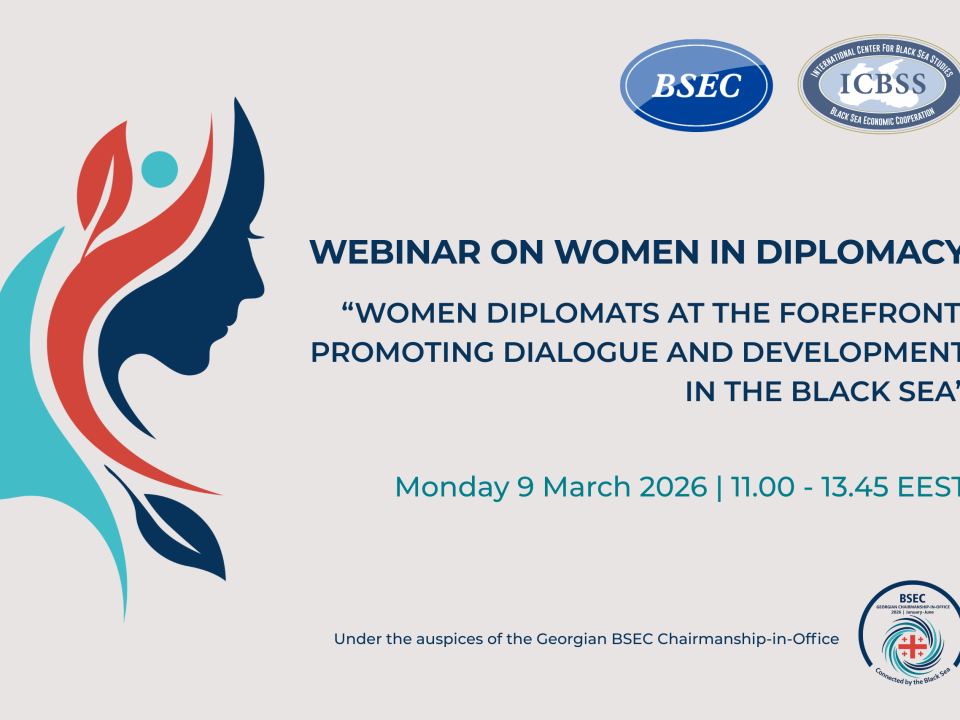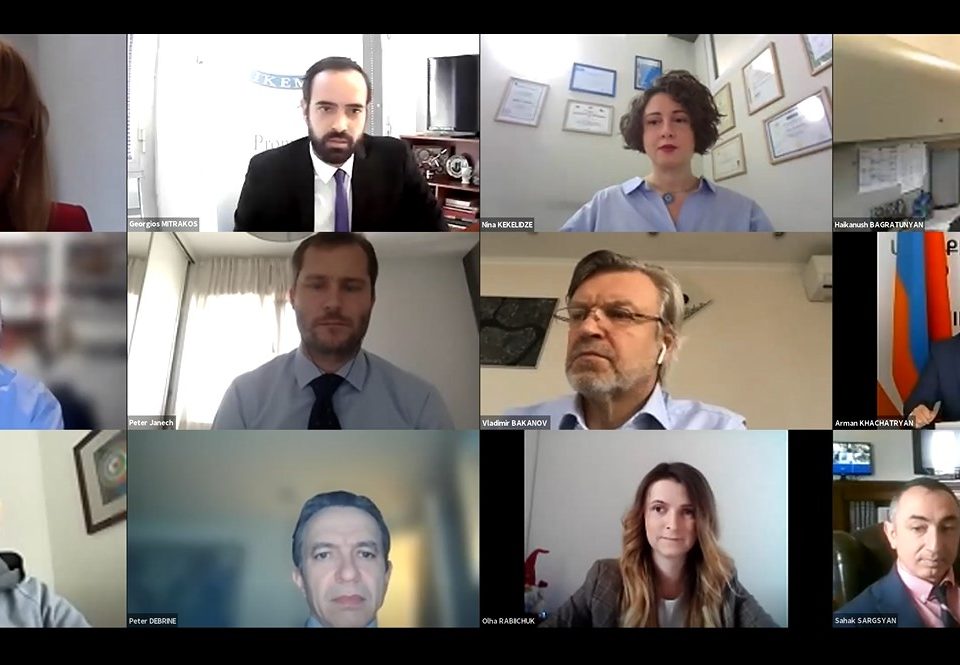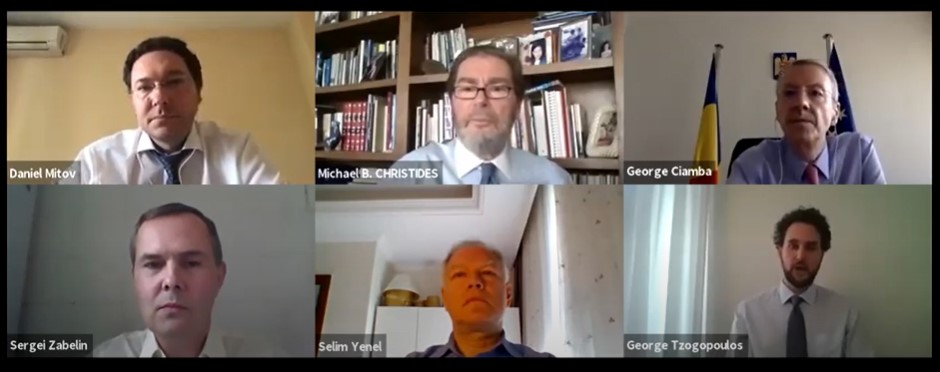
ICBSS - BSEC Webinar on "Black Sea Regional Cooperation during the Covid-19 pandemic"
19-5-2020
The International Centre for Black Sea Studies (ICBSS), in cooperation with the Organization for the Black Sea Economic Cooperation (BSEC) organised the webinar “Covid-19 crisis: is regional cooperation relevant in efforts to confront it? What could the role of international organisations be for the day-after in the Black Sea region?” on Tuesday 19 May 2020.
Distinguished panelists Mr. Daniel MITOV, f. Minister of Foreign Affairs of the Republic of Bulgaria, Amb. George CIAMBA, Ambassador of Romania to the Hellenic Republic and f. Minister for European Affairs of Romania, Amb. Selim YENEL, President of Global Relations Forum, Dr. Sergei ZABELIN, Senior Research Fellow at the Department for Black and Mediterranean Sea Studies, Institute of Europe, Russian Academy of Sciences, under the moderation of Dr. George TZOGOPOULOS, Senior Fellow at CIFE and Lecturer at Democritus University of Thrace, Greece discussed on regional cooperation during the covid-19 pandemic and the role of international organisations in the challenging post - covid-19 era, focusing on the Black Sea Region.
Overall, the discussion highlighted important issues for regional cooperation to be addressed in future discussions and deliberations. As underlined by Dr. Tzogopoulos on launching the event, it is an opportunity for the Black Sea region to constitute an interesting example on how countries can promote cooperation in order to overcome the obstacles at the public health sector and their economies, and the role of international organisations in this. Besides, Mr. Tzogopoulos stressed the importance of synergies in a period of rising uncertainty globally.
From his side, as noted in his opening remarks, H.E. Amb. Michael B. CHRISTIDES, Secretary General of BSEC PERMIS, being in charge of an international organization that promotes economic cooperation among its member-states, crisis periods highlight the challenges for coordination, but also, allow for new opportunities to emerge, a fact that applies not only in the Black Sea region, but also on international level. He then reflected on the “birth” of the idea for the organization of the webinar. “The idea matured after the first month of the pandemic lockdown. I asked myself how this economic cooperation could be implemented under these dramatic conditions in order to address some of the most crucial challenges that all BSEC member-states faced, like the supply of vital health provisions, the exchange of important information concerning the pandemic, the transport of food and medical supplies […] The current situation has shown the need for more cooperation and coordination, not only between states but also within the state, and has also provided us with several lessons of our approach on other issues such as the climate change” he added. Concluding, Amb. Christides expressed his hope that regional cooperation will come out stronger at the end of the covid-19 pandemic.
From his perspective, Mr. Mitov listed the pandemic’s consequences for regional cooperation, such as the “crisis of trust” towards the governments’ coronavirus statistical data on public health, that could contribute to a possible isolation of the countries or the competition for the coronavirus vaccine among countries, that could lead to a “vaccine nationalism” to be used as a geopolitical tool by the countries. Particularly commenting on the role of BSEC, Mr. Mitov emphasized the important role of international organisations. “I believe BSEC has a lot of potential in the area of health care and sciences” he added. Another tendency for Mr. Mitov is the “concept of an absolute sovereignty” that constitutes a threat for the international community and reflects the idea that the pandemic is a national issue instead of a matter of everyone. Following, the f. Minister analysed the change of countries’ attitude towards China in terms of political and economic dependence with consequences in trade balances. The priority of the citizens’ security and the limitation of their freedoms which they are ready to follow in the name of their safety as well as the new technologies that come into citizens’ lives as a permanent phenomenon, constitute also tendencies for Mr. Mitov. In addition, he mentioned that regional formats can promote the collaboration and can help the countries’ economies. Besides, he stressed the fact that the expertise is now being valued more than the past, as well as the must needed change of the global institutions’ infrastructure. As he noted, the danger for a global pandemic has been neglected for decades in national, regional and international level, given that the priority was on defense issues.
Ambassador Ciamba highlighted the interconnectivity and cohesion that should characterize the nations’ politics during and after the pandemic period, given the inevitable financial uncertainty. From the humanitarian perspective, Amb. Ciamba talked about the need for cooperation development among neighbouring countries and, especially among the BSEC countries when it comes to the Black Sea Region. Furthermore, he said that countries could share key industries and they should avoid any gestures that could disturb any kind of cooperation. The covid-19 crisis is also considered as a chance for rapprochement between countries according to the Ambassador. Moreover, Amb. Ciamba stressed the importance of the share of good practices that can combat the fake news and the misinformation. Finally, he talked about international organizations’ role during the pandemic and underlined that they should constantly support their member-states by adapting their activities accordingly.
Commenting οn the role of the international organizations, Amb. Yenel noted that their actions were affected by their member-states’ policies during the pandemic as these were not based on solidarity. Regarding BSEC, Amb. Yenel proposed the creation of a BSEC Working Group on disaster management that could work on a future crisis as well as the distribution of some guidelines to the member states for a better management of a future crisis. Finally, he stressed that the BSEC’s work is valuable, something that should be reminded constantly to its member-states.
Dr. Zabelin focused on the role of the nation states that should prove their role within the global governance system and underlined the high importance of a closer cooperation among all institutions within a country. Additionally, he analyzed the consequences of countries’ policies for migration, economy and issues like the citizens’ freedoms. Summing up, Dr. Zabelin appeared optimistic regarding the opportunities that have emerged from the pandemic.
Following their interventions, the panelists answered to participants’ questions. In total, 85 participants from around the world joined the webinar.
This constituted the first of a series of webinars planned by the ICBSS to launch a new era of online meetings on key issues targeting the wider Black Sea region. More information of the upcoming next webinar on blue growth will be announced in due course.
You may visit the ICBSS channel on Youtube to watch the full Webinar here.
***
Speakers' CVs
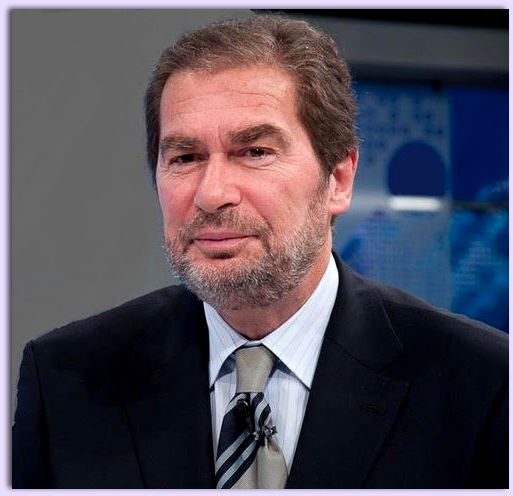
Ambassador Michael B. CHRISTIDES
BSEC PERMIS Secretary General
Ambassador Michael B. CHRISTIDES is the Secretary General of the Permanent International Secretariat (PERMIS) of the Organization of the Black Sea Economic Cooperation (BSEC), headquartered in Istanbul, Turkey. Born in Thessaloniki, Greece, Ambassador Christides joined the Hellenic MFA in 1976 as first in his Class and served with distinction until his retirement in August 2014. Among other assignments he served as Ambassador of Greece to Bulgaria, to Turkey and to Argentina and held senior posts in the Hellenic MFA as Political Director for South East Europe, as Director General for International Organizations, International Security & Cooperation and as Director General for International Economic Relations. Ambassador Christides participated in many international meetings and conferences and has spent more than 20 years dealing with S.E. European / Balkan issues, while travelling extensively in the region. He acquired a broad knowledge of the political and economic realities there and established a wide network of high-level political, business, academic and media contacts. He speaks fluent English, German, French, Italian and moderately good Spanish. After his retirement Ambassador Christides was elected by the BSEC Council of Ministers of Foreign Affairs as Secretary General of the BSEC PERMIS, assuming his duties on 1 July 2015. After the unanimous endorsement by all BSEC Member States, he was reappointed for a second three-year term-in-office, as of 1 July 2018 until 30 June 2021.
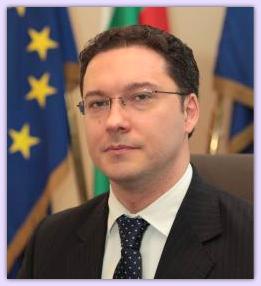
Mr. Daniel MITOV
f. Minister of Foreign Affairs of the Republic of Bulgaria
From September 2017 to February 2020, Mr. Daniel Mitov held the position of Resident Director for Eurasia Programming at the National Democratic Institute (NDI). From August 2014 to January 2017 Mr. Mitov served as Minister of Foreign Affairs of the Republic of Bulgaria. From 2012 to 2014 he was Resident Representative of the NDI in Brussels. His activities included promoting democratic practices and accountability in government in Iraq, Tunisia, Morocco, Egypt, Libya, Yemen, DRC etc. His responsibilities also required special focus in South-Eastern Europe and sustainable assistance of the programs based in Skopje, Pristina, Belgrade and Kiev. In the period 2010 to 2012 Daniel Mitov was Program Manager in the NDI-Iraq local programming, conducting trainings and consultations. From 2006 to 2010 he was appointed Executive Director of “Democracy Foundation”. Previously he joined the team of the Political Academy for Central and South-Eastern Europe (PACE) and took part in the establishment of the “Bulgarian School of Politics”. Mr. Daniel Mitov holds a degree in political science from Sofia University “St. Kliment Ohridski” and a specialization from New Bulgarian University. In addition, he is a German Marshall Fund fellow, has participated in the programs of the “Deutsche Gesellschaft für Auswärtige Politik”, “Programme d’invitation des personnalités d’avenir” of the French Foreign Ministry as well as Robert Schuman Institute in Budapest. His mother tongue is Bulgarian and he is also fluent in English, Italian and Russian.
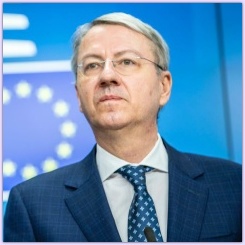
Ambassador George CIAMBA
Ambassador of Romania to the Hellenic Republic, f. Minister for European Affairs of Romania
Ambassador George Ciamba is a career diplomat who has joined the MFA of Romania in Dec. 1990. In 2004 he was granted, by Presidential Decree and according to the law, the diplomatic rank of Ambassador, in recognition for his contribution to NATO accession and EU accession negotiations. From 11/2018 to 11/2019, Amb. Ciamba was Minister for European Affairs, running the MFA team responsible with Romania’s first presidency of the EU Council, from 1/1 to 30/6/2019. During this period, he was the Chair of the EU General Affairs Council/GAC. As Minister for EU Affairs and Chair of the EU GAC, Ambassador Ciamba coordinated internally, together with line ministries of the Romanian Government and with the crucial support of the Permanent Representation of Romania to the EU, and externally, in close cooperation with the EU Member States and the European institutions, the common effort of negotiations that led to the successful conclusion of 90 legislative files. Besides this coordination effort, Minister Ciamba was regularly invited to present the EU Council’s position at the plenary sessions of the European Parliament (in Strasbourg & Brussels), and signed, on behalf of the EU Council, all legislative acts adopted under ordinary legislative procedure together with the president of the Europ. Parliament. In the six months of the Presidency, Amb. Ciamba was an active promoter of cohesion and convergence within the EU member states and a supporter of the enlargement process. As chair of the EU General Affairs Council, he worked on the adoption of Gas Directive, advanced negotiation on the adoption of Multiannual Financial Framework 2021-2027 and kept an active dialogue on Brexit. From 1/2017 to 11/2018, he served as Secretary of State for Bilateral and Strategic Affairs in the Euro-Atlantic Area, coordinating a wide range of subjects, from the strategic affairs -including NATO, US, arms control, disarmament and nonproliferation, cyber security and minority rights- to the bilateral relations with the EU Member States, candidate countries and regional cooperation formats. In 2016, as a Special Representative for Economic Diplomacy, he contributed to promoting and developing economic projects of strategic interests to Romania, and to consolidating the inter-institutional relations for the country’s international representation in the economic field. Since 11/2012 and until 2016, he served as Secretary of State for European Affairs, promoting an active participation of Romania at all EU levels and the national contribution to the elaboration of EU policies. He coordinated the sectoral positions in all the configurations of the EU Council and participated in the General Affairs Council (GAC). He represented Romania abroad as Ambassador Extraordinary and Plenipotentiary to the Hellenic Republic (2005-2012) and to the Republic of Turkey (1999-2003) and as Permanent Representative of Romania to the BSEC (2001–2003). From 7/2003 to 1/2005, he served as Secretary of State for Multilateral and subsequently, Global Affairs in the MFA, coordinating dossiers related to the EU, NATO, the Council of Europe, the UN and other international organizations. In 2019, he received the Order of the Star of Romania, as a recognition of Romania’s successful Presidency of the Council of the EU; in 2012 he was awarded the Order of the Phoenix–Grand Cross Grade, by the President of the Hellenic Republic; in 2000 received the National Order of Merit in the Rank of Commander from the President of Romania and in 1999 the title of Romanian Ambassador of the Year, awarded by Romanian Daily Nine O'clock and by Aspen Romania in 2019, the Leadership Award for the success of the Romanian Presidency of the Council of the EU. He speaks English & French fluently.
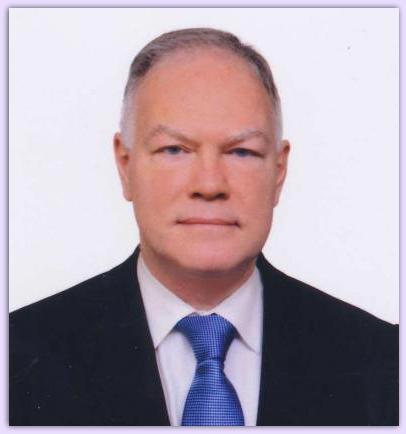
Ambassador Selim YENEL
President of Global Relations Forum
Selim Yenel was born in 1956 in Istanbul. He entered the Ministry of Foreign Affairs (MFA) in 1979. His first posting was the Turkish Delegation to the OECD in Paris between 1981 – 84. From there he went to the Turkish Embassy in Kabul, Afghanistan (1984 – 86). After coming back to the MFA he was posted to the Turkish Delegation to the UN in New York (1988 – 92). From 1994 till 1999 he was at the Turkish Delegation to the European Union in Brussels. He returned to Ankara and dealt with EU matters up until the opening of accession negotiations (1999 - 2005). Subsequently in December 2005 he was posted as Ambassador to Vienna until October 2009 when he returned to Ankara as Deputy Under-Secretary for Bilateral Political Affairs and Public Diplomacy. From December 2011 till January 2017 he was posted as Ambassador and Permanent Delegate of Turkey to the European Union. Upon his return to Ankara he became Undersecretary at the Ministry of EU Affairs until July 2018 when the EU Ministry and Foreign Ministry merged. In 2019 he was appointed as First Deputy Secretary General at the Black Sea Economic Cooperation (BSEC) Organization. In January 2020 he became President of Global Relations Forum. He is married and has a son and a daughter.
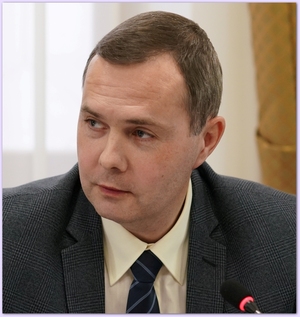
Dr. Sergei ZABELIN
Senior Research Fellow, Department for Black and Mediterranean Sea Studies, Institute of Europe,
Russian Academy of Sciences
From 2007 to present, Dr. Sergei Zabelin is senior researcher at the Department for Black and Mediterranean Sea Studies, Institute of Europe (Moscow), Russian Academy of Sciences. From 2018 to present he is the Representative (National director) of the Russian Federation in the Board of Directors of the International Centre for Black Sea Studies (Athens). Background: Department of Classical Philology, Lomonosov Moscow State University. Main research interests: the Black Sea Region, the EU and Black Sea countries, European Neighborhood Policy (Eastern Partnership), BSEC Organization, Greece and Cyprus issues. Languages: English and Greek.
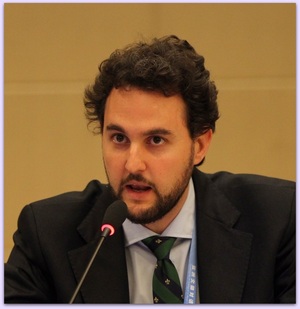
Dr. George TZOGOPOULOS
Senior Fellow at CIFE and Lecturer at Democritus University of Thrace, Greece
Dr. George N. Tzogopoulos is an expert in media, international relations and Chinese affairs. He is the Director of EU-China Programmes at the Centre international de formation européenne (CIFE) and Lecturer in International Relations at the Department of Law of the Democritus University of Thrace. Furthermore, George is a Fellow at the Begin Sadat Center for Strategic Studies (BESA) and at the Hellenic Foundation for European and Foreign Policy (ELIAMEP). He is also the Co-convener of the recently established Israel-Hellenic Forum under the umbrella of B’nai B’rith International.

